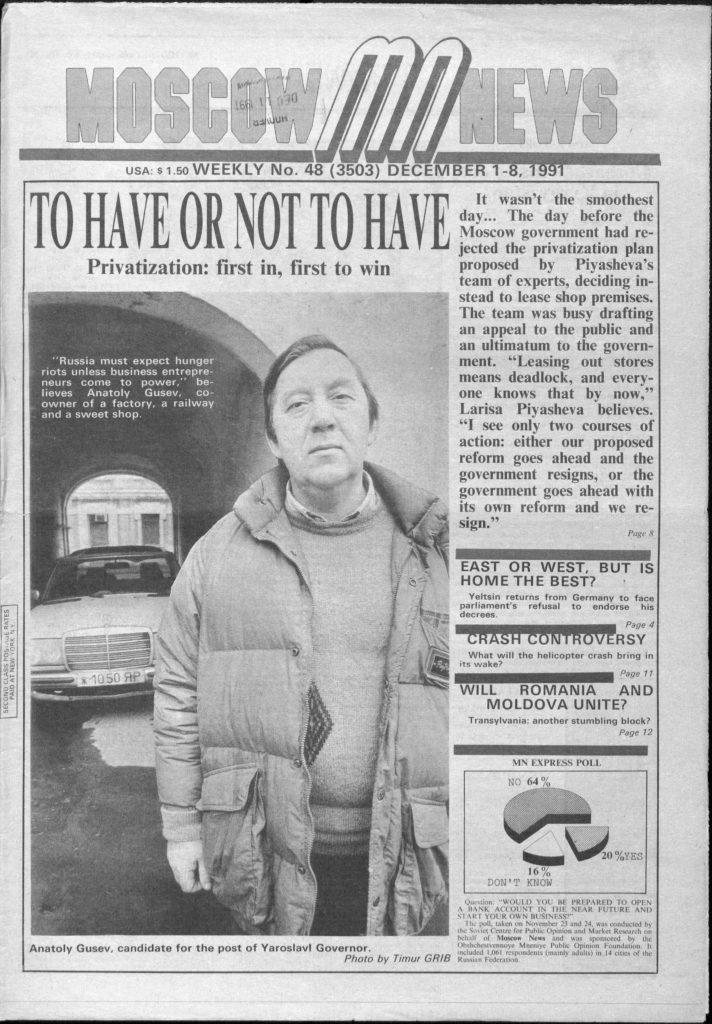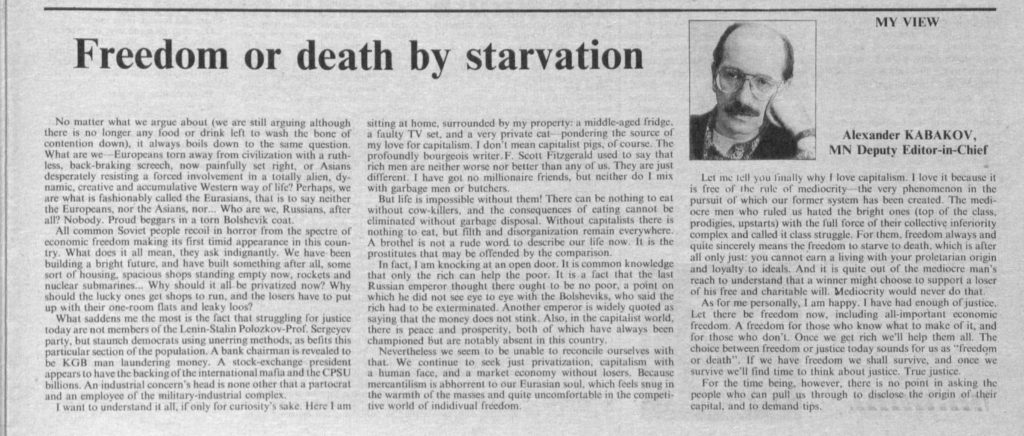By Liam Martin
The Dec. 1 issue of Moscow News was published less than a month before the Soviet Union ceased to exist as a formal political entity. However, the issue discussed the way in which the Soviet Union had long since failed as an economic project. One of the key characteristics of the Soviet system was a planned, publicly owned economy without privately held land. This system had been changing since Perestroika and Glasnost began under Gorbachev, but during Yelstsin’s rise to power and the corresponding collapse of Communist party authority privatization went from a creeping tide to a tidal wave that swept away anything in its path. Take, for example, the privatization of land in Armenia. Collective farms were abolished, and land was redistributed by lots or sold off to the highest bidder. Vladimir Kiselyov, author of an article in the issue, wrote: “I would describe what has occurred in the Armenian countryside with one word – revolution.” It seems to be an apt description. Where before there was no market, one seemed to appear like magic. The effect on Armenian agricultural production was no less revolutionary, Kiselyov notes that output had spiked so much that this was the first year where Armenia did not have to import grain.
Land privatization, already revolutionary in a Soviet context, was only the beginning of the story. In the article “Pictures of Privatization”, provinces across Russia described their plans for privatizing public resources. The city of Yekaterinburg’s property manager, Alexander Ryabtsev, stated that he planned to privatize 80% of public services and retail trade, though premises and offices would only be leased. All of the public property in the city of Yaroslav was planned to be privatized, and, as of the writing of this piece, a quarter of that worth 4 billion was being prepared for a first wave of privatization. Even in places where the government resisted privatization, such as the territory of Stavropol, the population was heavily in favor of it.
Ideologically and rhetorically, the fervor to privatize demonstrates a major shift in Soviet public discourse, even from a few months before. The market, and the mass privatizations that were a necessary part of the transition to capitalism, were not only good but inevitable. This rationale is laid out by Moscow News Deputy Editor-in-Chief Alexander Kabakov in an article aptly titled “Freedom or Death by Starvation.” in which he argues that the greed and corruption that seem to come with capitalism are a necessary, and even somewhat desirable, change. As he says, “There can be no meat without cow-killers, and the consequences of eating cannot be eliminated without garbage disposal.” In other words, if we want capitalism, we must be willing to accept the consequences of that choice. However, he does not necessarily think that these consequences are entirely, or even mostly negative. As he says,
“Let me tell you why I love capitalism. I love it because it is free of the rule of mediocrity – the very phenomenon in pursuit of which our former system has been created. The mediocre men who ruled us hated the bright ones (top of the class, prodigies, upstarts) with the full force of their collective inferiority complex and called it class struggle. For them, freedom always and quite sincerely means the freedom to starve to death…”
I can think of no more telling sign of the USSR’s ideological decay than the fact that such a full-throated endorsement of capitalist ideology and condemnation of communism would have been unthinkable a year earlier. Returning to the article on land privatization, it is perhaps fitting to end on the author’s reaction to the speed at which the country is changing underneath him. “Wait,” he said, “I was told, not everything can be done overnight…”
Liam Martin is a junior majoring in Russian, East European, and Eurasian Studies and International Studies
Works Cited
(1991, December 1). Page 1. Moscow News Digital Archive. Retrieved from https://dlib.eastview.com/browse/doc/49796897



